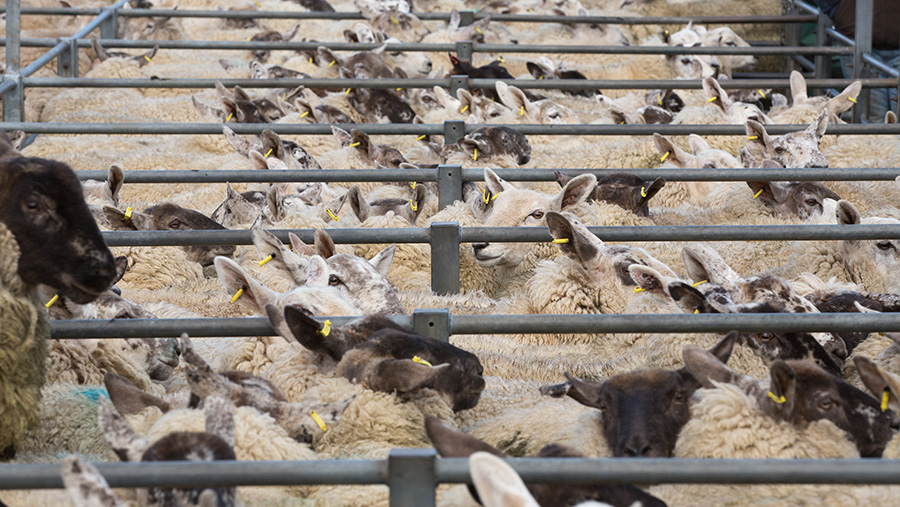Lamb prices under pressure – Hybu Cig Cymru analysis
 © Tim Scrivener
© Tim Scrivener Higher carryover stocks of lambs, reduced demand, and imports are all adding pressure to farmgate lamb prices.
A report by Welsh levy board Hybu Cig Cymru (HCC) – Meat Promotion Wales – shows how dry weather in 2022 led to lambs taking longer to finish, which has left a larger number of old-season lambs to come to the market in 2023.
In a typical year, the UK processes about 77% of the lamb crop by the end of that year, according to HCC figures. However, by December 2022 that had slipped to about two-thirds.
See also: Costs push store lambs back £21 to three-year low
As such, some 4.3m lambs are expected to come forward between January 2023 and April 2023.
HCC analyst Glesni Phillips said: “When compared to the 2021-22 lamb crop, this is a 13% increase [or 513,500 head] in the number of lambs left to be slaughtered, and an additional 25% when compared to the 2020-21 lamb crop.
“This would suggest there is a higher carryover of old-season lambs into 2023, which will likely apply pressure to farmgate prices.”
The GB liveweight lamb SQQ averaged 219.73p/kg on Friday 27 January, down by 14.9p/kg on the week and more than 40p/kg below the same week last year.
However, industry stakeholders suggest that last year’s drought may have had an impact on scanning percentages for early lambers in some regions, so the number of new-season lambs coming to the market in early 2023 may be slightly lower than expected, which could offer some support to markets.
Consumer demand
But consumer demand may also be weaker. Data from market analysts Kantar show that volumes of lamb in the retail market fell by 17.9% year-on-year in 2022.
Even though average retail prices were up by 9.7% to £10.04/kg, total spend was down by 9.9%.
Ms Phillips said that, while demand for lamb over Christmas was good, the January blues and continued cost-of-living crisis is not helping consumer demand for all kinds of premium proteins.
“There is evidence that consumers are looking to trade down at retail and cut back on eating out, so sluggish demand is not unexpected.”
Imports
There was also significantly higher volume of frozen lamb imports into the UK during 2022.
Trade data from HMRC shows that, in the first 11 months of the year, the UK imported £181m worth of frozen sheepmeat from New Zealand, up from £88m for the same period of the previous year.
Frozen sheepmeat imports from Australia also increased by £17.6m to £46.4m during the same period.
Ms Phillips said: “We have seen an increase in imports from New Zealand and this has come at a time when Welsh lamb supply is itself higher than usual because of delayed finishing times caused by higher feed prices and the summer drought stunting pasture growth.”
Northern Ireland
Pressure on farmgate prices has prompted Northern Ireland lobbying group Farmers For Action (FFA) to speak out.
FFA member Sean McAuley said: “Today, beef and lamb prices at the abattoir should be well over £7/kg to allow for a sustainable living for farmers in those sectors.
“Many farmers blame the corporate food processors who indeed certainly take their profits, but do so after a continuous price battle with corporate food retailers.
“However, those same corporate food processors keep coming back to the farmgate price paid to rake in their millions, and this has got to stop.”
